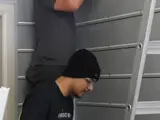- Two or more credits toward the Ontario Secondary School Diploma (OSSD)
- A competitive advantage when applying to future employment opportunities
- Valuable mentor relationships and networking opportunities
- Post-secondary supplementary application experience
- The opportunity to explore advanced career interests while in high school
- Sector specific knowledge and skill development
- Job readiness skills and experience
Cooperative Education
What is Cooperative Education?
Cooperative Education (Co-op) provides secondary students with valuable experiential learning to apply, refine and extend their learning from the classroom into the community. Co-op allows students to earn secondary school credits while completing a work experience placement in the community. Co-op begins with an in-school pre-placement learning plan to ready students for the community experience. Students work with the Cooperative Education Teacher to find a community work experience that aligns with their interests and skills. Students are monitored, assessed and evaluated by the Cooperative Education teacher and ongoing feedback is provided from the placement supervisor or employer. Most Co-op placements are designed as half-day programs.
Individual Pathway Planning and Cooperative Education
- Co-op is appropriate for all post-secondary destinations including: apprenticeship, college, community, university or work.
- Co-op is available in all of our HDSB secondary schools
- Students can apply up to two Co-op credits towards their compulsory course requirements, with no limit on earning elective credits towards graduation
- Students can earn apprenticeship hours and/or be registered as an apprentice while participating in an apprenticeable trade through the Ontario Youth Apprenticeship Program (OYAP).
HDSB Cooperative Education Program
Learn About the Cooperative Education Program from HDSB Co-op Students, Teachers and Employers.
Are you an employer interested in supporting our HDSB Cooperative Education Program?
FAQs
Why Consider Co-op For Your Student?
Co-op is a course for Grade 11 and 12 students that provides the opportunity to earn high school credits while getting experience in a professional setting. Students have the opportunity to develop transferable skills and gain experience in a field related to their area of interest. Co-op is a great option for students in every post-secondary pathway (apprenticeship, college, community, university, work).
What can co-op offer students?
Where can students work and how do they get there?
- Any environment that provides a safe, educational and supportive opportunity for learning is suitable for co-op
- Workplaces that are accessible with transportation that must be secured by the student/family
What does co-op look like within a student's semester?
The co-op course is either scheduled as:
- 2 credits in the morning OR afternoon where students will be working for approx 2.5 to 3 hours daily
OR
- a full-day placement (4 credits) where students will be working for approx 5 to 6 hours daily
All placement schedules will be individualized and will be developed between student, employer and the school during the semester to reflect the times of the school periods.
How does a student find an employer?
The entire co-op experience is approached as a learning journey, starting with how to market yourself and apply for your dream placement. While students typically search for and select their preferred co-op placement, teachers are available to assist and place students who may be struggling to decide on or secure an appropriate opportunity.
Can a co-op placement be virtual?
The HDSB has guidelines specific to virtual placements for both students and employers. The co-op teacher will review these guidelines with relevant students/employers. Companies must follow the Ontario Employment Standards Act even when acting as a virtual employer.
How does a student select co-op for their Grade 11 or 12 school year?
Students select COP 3O8 or COP 4O8 through their school’s annual course selection process in myBlueprint. Schools will direct students as to which co-op they should select.
When Your Student Is Enrolled In Co-operative Education
What components of the co-op program promote student safety?
- An initial general safety walk through is completed by the co-op teacher
- All site-specific safety training must be completed during the onboarding process by the employer
- Paperwork is completed to document the placement details
- Students, employers and teachers have regular communication, including site visits throughout the placement
Are students covered by insurance?
Students need to be covered by WSIB; this is secured through the completion of a Work Education Agreement (WEA). Typically students are unpaid and covered by WSIB through the Ministry of Education. If a student is paid (special circumstances/program), WSIB is covered by the employer. If there is a change from one of these circumstances to the other, the WEA can be amended before the change takes place to ensure the student is covered by WSIB. Any student injuries must be reported to the direct Supervisor and Teacher immediately.
How is the student’s attendance tracked while at placement?
Students will be asked to report on their hours at regular intervals (typically weekly) throughout the semester through a process determined by their teacher. Co-op teachers will also complete daily attendance for their co-op students based on students reporting their presence at or absence from placement.
How is my student being evaluated in co-op?
Throughout the semester, students will be given tasks to complete such as reflections, assignments, discussions, and a Learning Plan/Term Portfolio where students provide evidence of their learning. There are required assignments during the term and a culminating series of final performance tasks.
How will I know how my student is progressing at their placement?
Students will be encouraged to share their daily activities at their placement with their parent/guardian, in addition to the regular updates provided by the co-op teacher. At any time, parents and guardians are encouraged to reach out to their student’s co-op teacher for a progress update.
What if things don’t work out for the student at their placement?
It is very rare that a placement doesn’t work out; but if this should happen, the teacher will try to address any barriers to success and turn it into a positive learning opportunity for the student. However; the co-op placement can be ended at any point by the employer, student or teacher if necessary.







